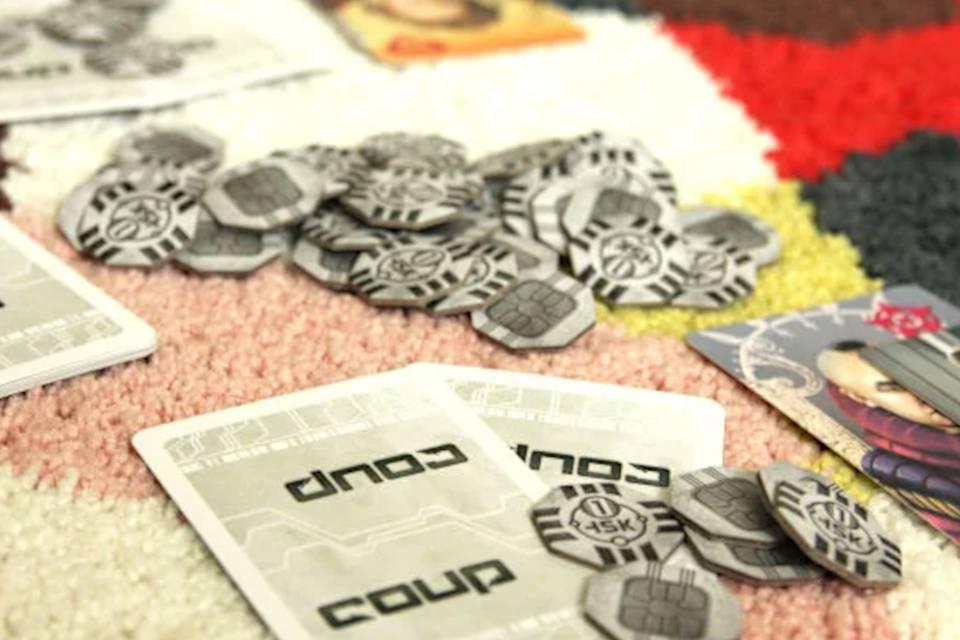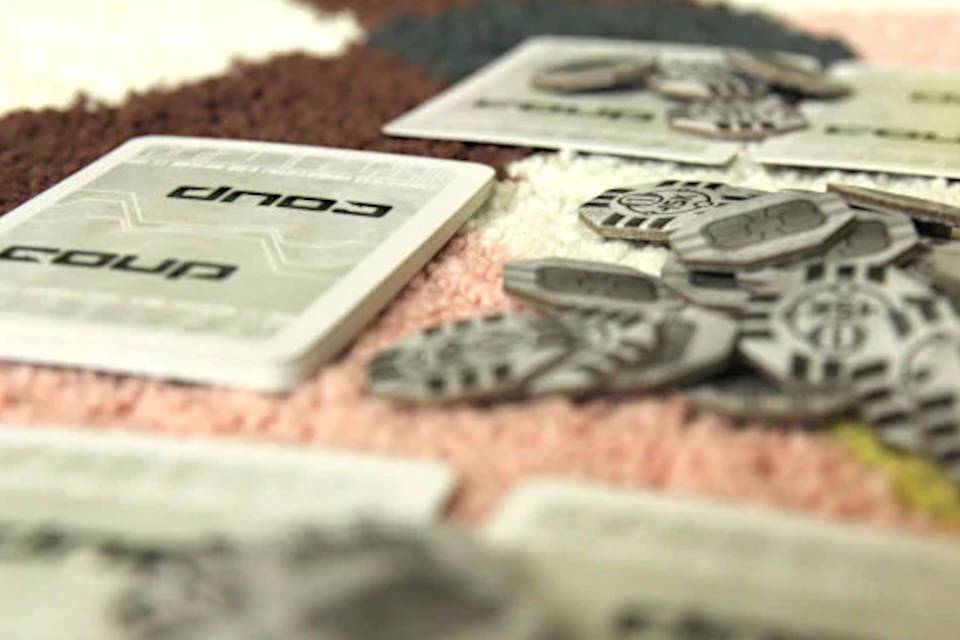
How to Play Coup With 2 Players: The Ultimate Variant
Coup is one of the best bluffing games to add to your collection. It's easy to learn, only involves cards and chits, plays in 15 to 20 minutes, and generates a lot of fun for how small and lightweight it is.
But if you go by the official rules, the game plays best at 5 players. It is, after all, a hidden role game packed with bluffing, so you need a good number of players to make that work. With too few, people can just guess their way to victory.
So then, is 2-player Coup just a pipe dream? No!
In fact, after a lot of experimentation and reading up on how others play Coup, I've found that this game is actually better when played with only 2 players—as long as you ditch the official 2-player variant in the rulebook.
A few simple tweaks can turn Coup into one of the most tense and exciting 2-player card games on the market. Keep reading to see why the official 2-player variant falls apart and how you should play 2-player Coup instead.
Note: This post assumes you know how to play Coup already. If you don't, I recommend watching Watch It Played's How to Play Coup video.
Why the Official 2-Player Variant Sucks
The official 2-player variant of Coup goes like this:
- The start player starts with 1 coin. The other player starts with 2 coins.
- Divide the character cards into 3 decks, with each deck consisting of 1 of each character type. Each player takes a deck, picks 1 character, and discards the remaining cards. Then, with the third deck, deal a second character to each player. Then, the remaining 3 characters become the court deck.
I can see what designer Ricki Tahta was going for here. The first tweak is an offset to first-player advantage, while the second tweak attempts to limit the number of variables so both players can glean a bit more information, especially when they look through the court deck using the Ambassador.

But the official variant doesn't address the elephant in the room when it comes to Coup with only 2 players: the Assassin character is so overpowered that the game essentially always comes down to one decision.
If the opponent claims to be the Assassin, you have three options: accept it at face value, counter with a Contessa, or call their bluff.
Calling an Assassin's bluff is always risky in Coup, but it's infinitely more risky here because the game instantly ends if they do have the Assassin: you lose a character for failing the challenge, plus you lose a character for being Assassinated.
You don't have enough information in this variant to know whether it's a bluff or not, so it's smarter to eat the Assassination or counter with a Contessa. In practice, it feels a lot like rock-paper-scissors.
The other issue with the official 2-player variant is that the Coup action is disproportionately more important. After all, the first to Coup twice wins, period.
What should be a game of bluffing and deduction is reduced to a race for coins, blind actions, and unfounded challenges. Coup doesn't have much gameplay to begin with, and the official 2-player variant strips it of whatever it does have.
The Ultimate 2-Player Coup Variant
Instead of the official 2-player variant, I use the following tweaks:
1. Use the "Call the Coup" rule. This is a rule that's been popularized on BoardGameGeek and Reddit, and it goes like this: When using the Coup action, you must name a specific character to kill.
If the other player has that character, it dies like normal. But if they don't have that character, they prove it by revealing both of their character cards. Then, they draw two cards from the court deck into their hand, pick two of the four to keep, and return the other two to the top of the court deck.
Optionally, you can also use this rule for Assassinations, too!
2. Play with five lives each. Both players still start with 2 characters, but when a character dies, it gets flipped face-up and set aside, then replaced with another character drawn from the court deck. (When your fourth and fifth characters die, DON'T replace them. As soon as someone's fifth character dies, they lose.)
3. Play with a full 15-card court deck. No need to hassle with the unintuitive "split into three decks" setup used by the official 2-player variant.
Why This Variant Is Better
Why play with the "Call the Coup" rule? It weakens the Coup action by introducing an element of risk. You can pay 7 coins and totally fail with no gain, so it's in your interest to suss out your opponent's characters before calling a Coup.
Not only does this eliminate the race for coins, it allows you to catch up from behind if you can mislead your opponent and get them to incorrectly call their Coups.
This rule incentivizes dishonest play since you don't want the opponent to know which characters you have. It forces more mind games and reduces the importance of which cards you draw, thus reducing the luck element.

It also strengthens the Ambassador, which now comes in handy whenever you think your opponent has you figured out. If they've collected 7 coins and you think they're going to call a Coup on you, this can put them off balance.
Why give each player five lives? Because it eliminates the fatal flaw where one mistake can lose you the game. With more lives, a single Assassin can't wipe you out in one attack. It gives you more time to gather information about what the opponent has, and it opens up more strategies as the game evolves.
Why play with a full court deck? It strengthens the game arc. With a full court deck, the game starts off with a good amount of luck involved, but as characters die and the court deck shrinks, it becomes easier to deduce which characters are left so you can make more informed decisions.
With these tweaks in place, I honestly think Coup becomes one of the best psychological 2-player card games with an interesting blend of strategy, deduction, and bluffing. Try it out! You might be surprised.
Link nội dung: https://vosc.edu.vn/coup-boardgame-a73743.html